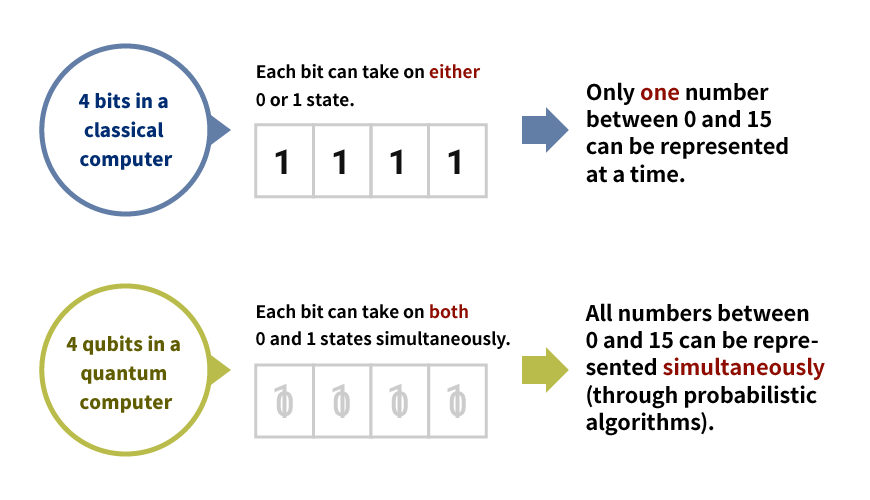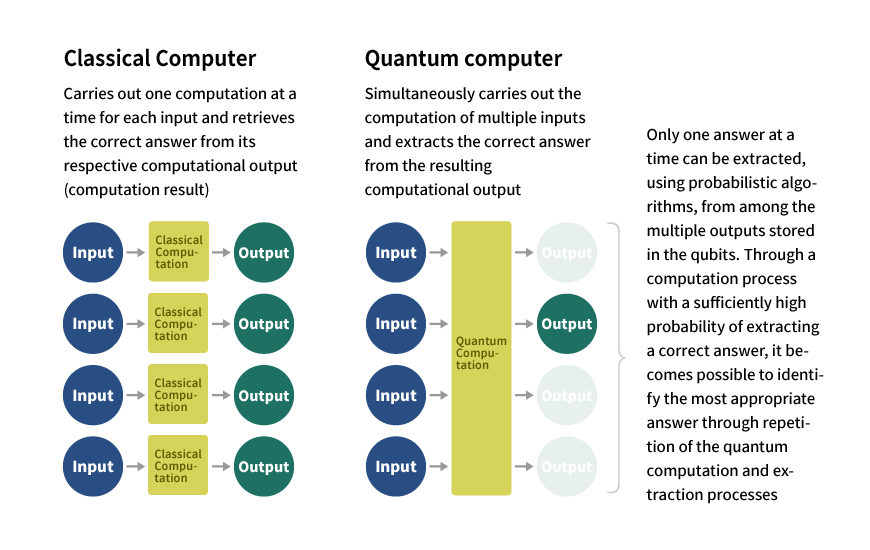- TOP
- Columns
- The Incredible Capabilities of Quantum Computers Breaking the barriers of classical computing

A world where the pressing issues are resolved with computers running on quantum mechanics
The Incredible Capabilities of Quantum Computers:
Breaking the barriers of classical computing
The term “quantum computing” has seen an uptake among mass media in recent years. The quantum computer is rapidly evolving from an academic engineering challenge to a practical tool used in real-world and business activities. However, quantum computers are difficult for many to understand as their computational principles are based on physical theories of quantum mechanics. This article aims to shed light on quantum computers for those interested in understanding their underlying principles, differences from conventional computers, current state of development, primary issues, anticipated applications, and forecasted impact.
Growing Interest
Although 30 to 40 years have passed since the start of theoretical research on quantum computers, it was not until the 21st century that the machine began to draw public attention. In recent years, there has been a worldwide upsurge of startups pursuing businesses in the field. Even industrial giants such as Google and IBM have intensified their research & development activities in the field, and Japanese manufacturers have also begun to develop and use quantum computers. Although use is still limited, quantum computers are expected to become realistically available in only a few years’ time and have gradually become a presence that cannot be ignored in the business world.
Why Now?
In addition to advances in research & development, quantum computers are attracting interest due to the increasing scale and complexity of real-world problems and the limitations of traditional computers, or “classical computers”.
The term “classical computer” refers to the machines we use every day. They are deemed “classical” in respect to quantum computers, an allusion to the field of physics in which the theories of dynamics existing before quantum mechanics are referred to as classical mechanics.
There are countless real-world problems that supercomputers, a large-scale classical computer, cannot solve even with thousands of years or thousands of supercomputers performing parallel calculations. The amount of power needed by these supercomputers would be enormous and would require several hundreds of nuclear power plants.
In short, we will not realistically be able to solve many of the issues facing humanity using classical computers. One might even say that humans will become extinct before such issues can be solved.
Therefore, quantum computers are essential due to their potential to solve problems previously thought to be unsolvable while needing dramatically less power and time.
Are They Fast?
One common misconception is that quantum computers feature a fast computing process. However, individual computational processes are not always carried out at high speeds. The true value of quantum computers lies in their short total computation times, achieved by dramatically reducing the number of computational steps through the artful application of computational principles.
The bit serves as the basic informational unit of a classical computer whereas quantum computers make use of what are called “qubits”. Normal bits can only take on one state at a time, either “0” or “1”. However, qubits can take on both states simultaneously when performing calculations through their application of the superposition principle of quantum mechanics. Bits are combined to express information like numbers, and with a given number (n) of qubits, twice the number (2n) of states, and thus information, can be represented simultaneously and handled in only one calculation step through quantum computing. In other words, quantum computers can dramatically reduce the number of calculation steps required.
Difference between bits used in classical computers and qubits used in quantum computers

Source: Mitsubishi Research Institute, Inc.
Challenges
The creation of qubits and using them to perform computations are very sophisticated and difficult technical feats. No easier is the development of algorithms for extracting correct answers from calculation results. Qubits perform calculations while taking on both the “0” and “1” states simultaneously, but when extracting a final answer, the qubits must be measured as either a “0” or “1”. The state of a qubit must be measured and defined through the application of probability theory, and while there is a plethora of calculation results due to the superposition principle, it is virtually impossible to identify the true answer to a problem through the random extraction of just one calculation result.
Quantum computers require users to reduce the number of required computational steps through clever use of their unique computational properties and to develop algorithms that extract useful answers from the computational results. One of the challenges of quantum computers is that the final correct answer to a problem cannot be ascertained before running its calculations, but sophisticated algorithms provide a means for their extraction.
Currently, only a few dozen such algorithms exist. They have been developed for consequential quantum chemical simulations, and there are high expectations for their application in machine learning and artificial intelligence. The result is a strong backing among universities, research institutions, and industry members for the development of quantum computers.
Computational Steps of Classical & Quantum Computers

Source: Mitsubishi Research Institute, Inc.
Culmination of 100 Years of Quantum Mechanics
The field of quantum mechanics came to fruition nearly 100 years ago through the pure curiosity of physicists. Since then, quantum mechanics have seen multiple applications in the real world to fields such as electronics before its most recent application to quantum computing. Quantum computers can be considered the culmination of 100 years of quantum mechanics and an example of human curiosity giving birth to innovation.
[References]
[1] Japan Science and Technology Agency “Strategic Proposal: Quantum Computer Science for All” (2018)
[2] Japan Science and Technology Agency “Science and Technology Future Strategy Workshop Report: Quantum Computer Science for All” (2018)
[3] Qmedia “Top 10 Common Misconceptions of Quantum Computers”
https://www.qmedia.jp/misunderstanding-of-qc/
(Accessed: November 30, 2019)
[4] National Academies of SCIENCE “Quantum Computing Progress and Prospects” (2019)
[5] BCG “The Next Decade in Quantum Computing—and How to Play”
https://www.bcg.com/ja-jp/publications/2018/next-decade-quantum-computing-how-play.aspx
(Accessed: November 30, 2019)
